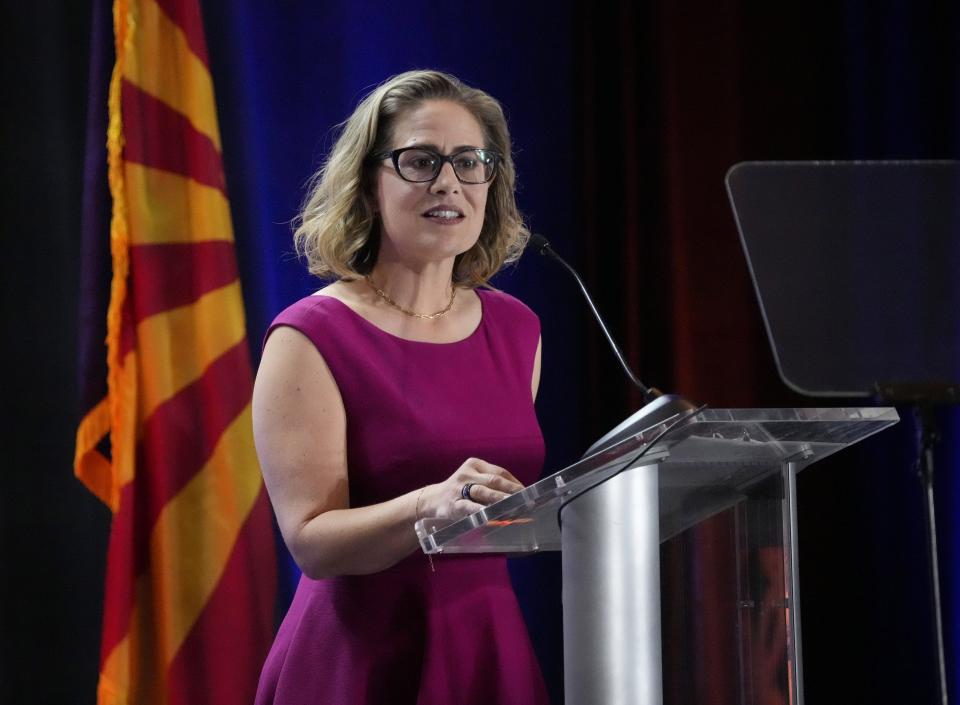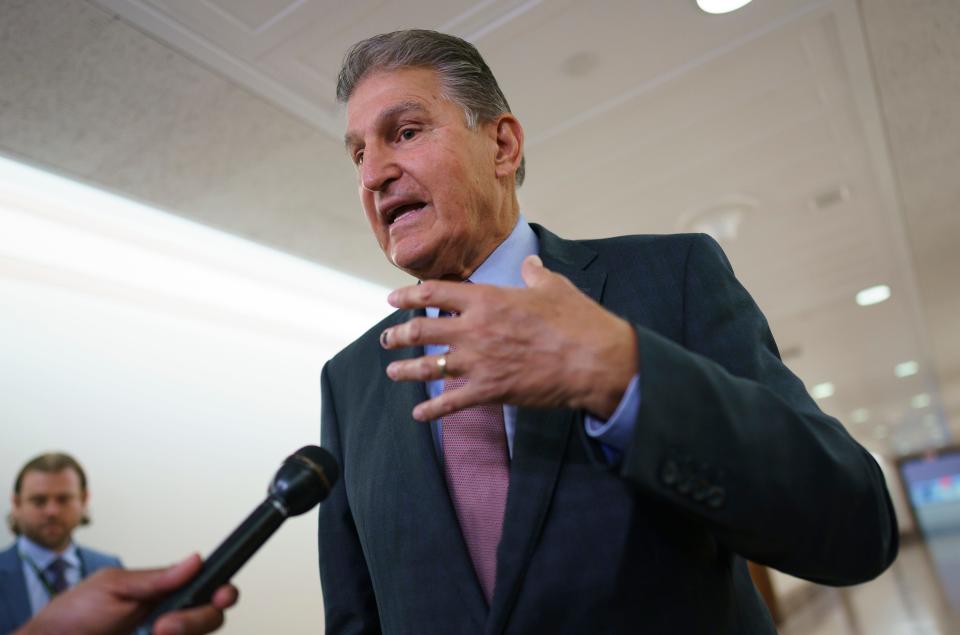Democrats deal with Sen. Joe Manchin raises new question: What about Sen. Kyrsten Sinema?
- Oops!Something went wrong.Please try again later.
- Oops!Something went wrong.Please try again later.
- Oops!Something went wrong.Please try again later.
- Oops!Something went wrong.Please try again later.
Senators barely had finished passing a bipartisan bill to boost semiconductor production in the U.S. Wednesday when Democrats got word of another potential legislative lift: Sen. Joe Manchin surprised Washington by backing a wish list targeting climate change and health care finances.
Manchin, D-W.Va., seemed to torpedo a slimmed-down version of President Joe Biden's climate and health agenda weeks earlier, but announced his approval of a revised $433 billion plan with Senate Majority Leader Chuck Schumer, D-N.Y.
In an evenly divided Senate, Manchin's support brings the plan closer to possible passage, though even one Democratic defection could still sink the plan. Because of that, all eyes quickly turned to Sen. Kyrsten Sinema, D-Ariz., who could have reservations about at least one facet of the plan.
Hannah Hurley, a Sinema spokesperson, declined to comment, noting they had not yet seen specifics of the bill.
The latest plan could put the focus back on Sinema, who helped broker a $1.2 trillion bipartisan infrastructure plan into law last year, helped thwart Biden's Build Back Better plan when its price tag topped $3.5 trillion in 2021, and helped form the bipartisan coalition that passed changes to gun sales and mental health resources in June.

Sinema isn’t the only potential hurdle. The deal would not expand tax deductions for state and local taxes. Sen. Bob Menendez, D-N.J., quickly reiterated an interest in changing that because the issue affects many coastal residents, where property values and taxes are much higher.
The tentative Manchin deal, cast as a series of investments to combat inflation, needs to maintain solid Democratic support and must be deemed acceptable to the Senate parliamentarian to pass on a party-line, simple majority.
If it does, as it stands it would include new spending on mitigating climate change and spurring new, clean energy production.
Democrats would plan to offset some of the cost of these initiatives by instituting a corporate minimum tax they estimated would raise $313 billion and would allow Medicare to negotiate for lower prescription drug pricing on select medicine. That would save an estimated $288 billion, according to the Democrats.
Sinema has long supported efforts to mitigate climate change and last year helped shape a plan to cap out-of-pocket prescription drug prices during the on-again, off-again efforts to pass some form of Biden's Build Back Better domestic agenda.
That plan, and similar, scaled-down versions stalled in the months since until gaining new life on Wednesday.
The party's summary didn't explain how the IRS would raise an estimated $124 billion, other than to say it wouldn't include new taxes on families earning less than $400,000 annually or small businesses.
The summary also refers to $14 billion in new revenue from a tax provision known as "carried interest" that affects very high-income taxpayers, such as hedge fund managers.
Sinema has not sketched out her thinking on carried interest changes. But she has drawn hard lines on other areas of tax policy.
Sinema reiterated earlier this year that she opposed raising the corporate income tax rate, citing concerns about its effect on the nation's economic growth.
But last year she said she was willing to institute a corporate minimum income tax because that would presumably affect the companies that now elude all income tax.
Carried interest allows the general partner overseeing an investment fund to pay taxes on profits at the rate charged for investors rather than as regular earned income.
The capital gains tax charged on investment growth, along with a related investment tax, tops out at 23.8%, according to the nonpartisan Tax Policy Center. By contrast, the top income tax rate stands at 37%.
The cash savings from the lower tax bill can be enormous for those in the lucrative investment industry. For example, the difference between the two rates on $10 million in income is about $1.3 million in lower taxes.
Incomes for those affected by the carried interest provision is often much larger.
Those in private equity and hedge funds had about $14.3 trillion in assets under management in 2019, a 40% increase in four years, according to the nonpartisan Congressional Research Service.
Carried interest as an issue has a long history as a target, often from liberals wanting to raise big money from relatively few, very wealthy sources.
But it's not exclusively from the left.

In 2015, then-Republican presidential candidate Donald Trump said on CBS' "Face the Nation" that he wanted to change carried interest, which he viewed as fundamentally unfair.
"They're paying nothing, and it's ridiculous. I want to save the middle class," Trump said. "The hedge fund guys didn't build this country. These are guys that shift paper around and they get lucky."
Even so, the 2017 corporate tax cut legislation he signed into law preserved the favorable treatment for carried interest.
Sinema, then a member of the House of Representatives, voted against the corporate tax cuts, like every Democrat in the chamber.
A year later, she voted to make permanent Trump's temporary tax cuts for individuals.
She later hit then-Rep. Martha McSally, R-Ariz., her opponent in the Senate race, for supporting "huge tax breaks for the wealthy and large corporations at the expense of our middle class."
Reach the reporter Ronald J. Hansen at ronald.hansen@arizonarepublic.com or 602-444-4493. Follow him on Twitter @ronaldjhansen.
This article originally appeared on USA TODAY: Schumer-Manchin deal turns focus to Sen. Kyrsten Sinema

